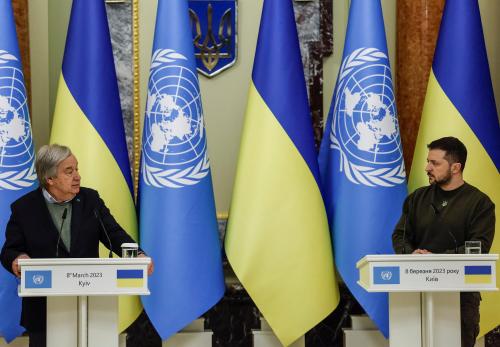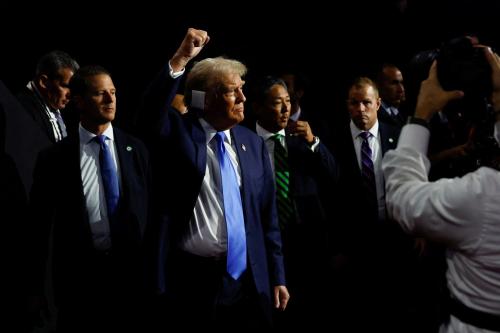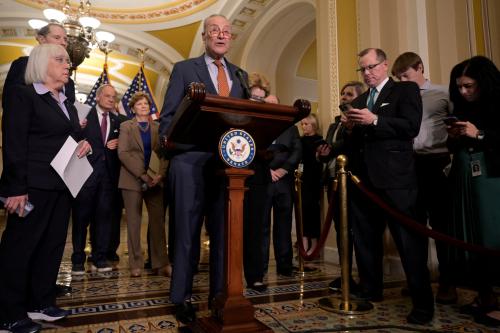This essay has been adapted from a keynote address that was delivered at Brookings’s 10th annual Justice Stephen Breyer Lecture on International Law on April 5, 2024 at Brookings.
In this lecture, I want to tackle the following question: What’s in store for the global legal order now that the West—for all its power and influence—seems to be no longer hegemonic? In other words, as we enter a new age of strategic competition, should we be concerned about the so-called “rules-based order” and, if so, what should be the precise nature of our concern?
Finding alternative answers is rather urgent because if you move in trans-Atlantic circles or read the major newspapers and magazines in the English language, you will notice that one specific storyline is taking root quite rapidly. It holds that the future of international law hinges upon the changing balance of power between liberals in the West and their enemies in the West and beyond it. The enemies include the forces of illiberalism at home, autocratic Russia, autocratic China, and the multitude of nonaligned developing countries that, apparently devoid of any strong moral commitments, seek to take advantage of the current situation, hedging their bets rather than siding with the rising autocrats or the West.
This storyline now appears everywhere. Consider reactions in the West to Russia’s break with international law in its invasion of Ukraine. Much of the commentary has focused on Chinese support for Russia and its implications for international law as well as developing countries’ refusal to impose meaningful sanctions on Russia beyond formal condemnation in the U.N. General Assembly. If the postcolonial world is unwilling to punish such a glaring violation of the principle of non-intervention, the argument goes, it must be because these countries don’t care for rules, because they resent the West, or because they are beholden to Russian President Vladimir Putin. The same goes for those leaders and movements within the West who argue for suspending the current levels of support for Ukraine.
Or take the war in Gaza. In the wake of the horrific atrocity perpetrated last October by Hamas, commentators in the West have struggled to make sense of what is going on. First, it has been challenging to make sense of the South African case for charging Israel with genocide against the Palestinian people at the International Court of Justice, and the widespread support that followed from countries as varied as Ireland and Pakistan. Then, it has been challenging to understand the refusal of so many postcolonial countries to label Hamas a terrorist organization. And then there is the issue of profound domestic division along demographic lines over support for Israeli policy across the Western world. Explanations proliferate, but they invariably return to the idea that changes are taking place that could affect the global legal order as we know it.
It is easy to see why the traditional “the liberal West against the illiberal rest” motto should remain so attractive. The idea of a law-abiding Western community confronting rivals who are bent on upending the existing legal order is appealing in its simplicity. But today I want to argue that this mode of thinking is empirically inaccurate and politically dangerous. It is inaccurate because it assumes modern international law and its liberal features are primarily a product of Western preferences rather than the outcome of hard-fought political battles across cultural and regional divides. It is inaccurate also because it ignores the extent to which the West often hurts the legal principles it helped create and the degree to which its officials have been willing to sacrifice core norms at the altar of great power competition. And it is politically dangerous because it fails to acknowledge the fact that doing battle against illiberalism at home and abroad will require a much deeper engagement between liberals in the West and liberals outside the West than we have seen thus far. If we are to properly protect the global legal order in an age of strategic competition, we should retire the “West versus the rest” framework and come up with something better instead.
Making international law
To begin, I want to turn to the historical evolution of the modern legal order. By modern legal order I mean the codified rules, norms, and institutions that have evolved to govern relations between nation-states. From the nineteenth century onwards, this order began to feature ingredients drawn from the liberal tradition, with a focus on promoting peace among nations by way of increasing global wealth through free economic exchange, limiting the use of force through the law, and, over time, promoting the end of empire, fostering self-determination and sovereignty rights, and protecting the rights of individuals. Tracing back the turbulent evolution of the legal global order and its liberal components reveals that Europe featured prominently in the story, but it was far from alone.
In the European order of the seventeenth and eighteenth centuries, the colonial system determined who enjoyed legal standing, who could trade, where migrants would flow, and whose culture would provide acceptable pathways for progress. By the late eighteenth and early nineteenth centuries, however, European dominance of the international legal system had come under serious challenge. Leading the revolt were the United States and Japan, India and China, Haiti in the Caribbean, and the bulk of newly-independent Latin America. Their legal opposition against empire opened the door to key struggles over freedom that would play out well into the twentieth century—the struggle for sovereignty and decolonization, for racial equality, for economic justice, and for cultural liberation.
In the wake of World War I, the victorious powers at Paris surely laid down the roots for what would become the Covenant of the League of Nations, but as recent histories have shown, one of the most relevant outcomes was the unexpected spread of the norm of self-determination, evolving in ways that European and American diplomats did not expect or control.
Other recent historical work sheds similar light on the dense network of norms and regulations that made up the U.S.-led order built around 1945. The United Nations was not a gift from the West to the postwar world, but the outcome of a hard-fought battle over principles and the distribution of power between the Security Council and the General Assembly. Turning American and British designs for the Bretton Woods institutions into reality involved painstaking negotiations with Latin American nations that would be their first clients. The building of the trans-Atlantic and trans-Pacific alliance system is not a story of U.S. officials deploying sticks and carrots to rally subordinate states around their cause, but a story of interactions with much weaker polities that deeply affected the character of the Cold War order. The Treaty on the Non-Proliferation of Nuclear Weapons saw two superpowers collude to advance non-proliferation, but in exchange for concessions that originally they were unprepared to make.
What I am suggesting is that what we now call the “rules-based order” was not created by Western fiat. The Non-Aligned Conference at Bandung in 1955 and the Suez Crisis in 1956 set the stage for countries to legally challenge the colonial entitlements of their former metropoles. Resistance to Western dominance from Angola to Vietnam, Algeria to Afghanistan, paved the way for many of the rules constraining the use of force that we now have. The trade law that we now know was deeply shaped by former colonies asserting permanent jurisdiction over their natural resources, and by coalitions of countries from the postcolonial world who pushed against Western protectionism. The human rights revolution of the 1970s and 1980s cannot be understood without reference to postcolonial civil society organizations trying to curb the ability of Western powers to support brutal dictators in the Third World. In doing this, non-Western players built and leveraged transnational connections with Western government officials, intellectuals, members of the U.S. Congress, leaders of the opposition, and civil society movements and organizations.
Or consider the neoliberal revolution. During the 1980s and 1990s, the West reasserted its dominance on multiple fronts, pushing for market reform, deregulation, and selective democracy promotion on a global scale. The United States in particular worked to avoid the constraints of international law by expanding the practice of the extraterritorial application of American domestic law, sometimes through the imposition of sanctions, sometimes through the establishment of certification processes. During this period, it became evident that international law was rapidly transitioning from a traditional model of a thin contractual system of rules negotiated by state representatives into a much denser network of principles and procedures including international panels, courts, and methods for arbitration. These changes opened up unprecedented avenues for political action on the part not only of weaker nations but also of transnational coalitions of central bankers, policy experts, legal scholars, social activists, and members of various churches.
The idea that the rules that govern our world today were concocted within a Western community before outsiders were invited to join is largely fictional. This is why the “West versus the rest” concept is so deeply problematic. It implies not only a law-abiding West confronting a law-breaking rest, but it also implies that an enlightened, liberal compact faced a backward, illiberal opponent. It paints the global legal order as resulting from an all-dominant master that effectively controlled helpless subordinates devoid of agency. And it ignores the transnational currents that have historically connected Western and non-Western societies in ways that even the most powerful states have found impossible to control.
But before we can effectively retire the “liberal West versus the illiberal rest” framework, we must grapple with two very important issues that it brings to the fore.
Law and the changing balance of power
First, implied in the “liberal West versus the illiberal rest” framework is the notion that the end of Western hegemony will seriously hurt the rules-based order and most specifically its liberal components. The underlying idea here is that there is a deep connection between the global balance of power, on the one hand, and the character of the legal order on the other.
The standard narrative that is now being revived with full force is the notion that Western hegemony has been a precondition for the global rule of law, and liberal law at that. But is this indeed the case?
Cast your minds back to the moment that best represents the height of Western hegemony, at least in our generation: unipolarity. This was that rare historical period in which America was the only great power in the world, and the global legal system was ripe for liberal transformation. And yet, in the wake of 9/11, the “war on terror” taught us the bitter lesson that liberal great powers can do an awful lot of illiberal things, especially when their power is unchecked.
The policy decisions that followed 9/11 marked a major departure from the decades-long consolidation of the rules-based order. Powerful constraints on the use of force were upended first by the second Bush administration in Iraq and then by the Obama administration in Libya. Liberal America debated the conditions under which torture could be legal, and how best to avoid accountability for targeted killings in foreign lands. The “responsibility to protect” doctrine revived arguments for humanitarian intervention that to all practical effect suspended standard conceptions of state sovereignty. And ideas reemerged which had been dormant for a century, such as the utility of protectorates and notions of graduated sovereignty. Two pillars of the global legal order suffered enormously as a result: self-determination and human rights.
The same can be said of the impact of the unipolar moment on the rules of global economic governance. The push for deregulation and the abandonment of the “embedded liberalism” that had been at the heart of the Western order for much of the Cold War unleashed economic dynamics that fueled demands for protectionism and mercantilist thinking within the West. By the 2010s, the rules-based order was under threat not primarily from non-Western states but by developments in the West.
So, it is no wonder that much of the world—including diehard liberals outside the West—should welcome the end of Western preponderance. The argument here is that if you are weak and you care about freedom and liberty, then the balance of power is critical. When power is hegemonic, the strong get to throw caution out of the window and conduct policy that is capricious. From this perspective, multipolarity can be virtuous precisely in protecting liberal elements in a global order. Indeed, there is a deep-rooted tradition in Western liberal thought according to which a balance of power makes the preservation of freedom possible in the first place.
Might the end of Western hegemony and the emergence of more balanced power bode well for the future of liberal principles enshrined in the global legal order? Does such an expectation even make any sense at a historical time when those who balance Western hegemony are not liberal great powers, but autocratic Russia and China?
I cannot answer these questions here, but it is important to make one point that normally gets no attention in the contemporary discussion about the global legal order. For many countries around the world today, it is clear that both Russia and China are willing (and increasingly able) to revise the rules they are unhappy with, selectively. But it is equally clear that neither Moscow nor Beijing is willing to burn down the “rules-based order.” They have used international law extensively in recent years to cement their ascent, and using the language and practices of legal argument has played an essential role in legitimizing their growing authority in world politics. From this standpoint, neither Russia nor China can be described as radically revisionist—even if Russia has illegally conquered territory and launched war, and even if China is overtly challenging maritime law. In this view, China and Russia, like all great powers, including the United States, will break the rules they don’t like, try as much as possible to push for the rules they like, and use vast amounts of hypocrisy to justify their preferences. From the vantage point of the majority of countries today, then, the option is not so much between a world safe for democracy versus a world safe for autocracy, but a world where the strong are unconstrained versus a world where there is some balance.
Civilization versus truth: Pick your standard
The second issue that the “liberal West versus the illiberal rest” framework brings to the fore and we must tackle head-on is that of the relationship between culture and the present legal order.
There is a long tradition of thinking that links international law not to sovereign states negotiating rules with one another but with a community of shared values—be they rooted in Christianity or the broader ideals of civilization. The so-called “standard of civilization” was at the heart of Western conceptions of legal order in the age of European preponderance and in the age of American ascent. It was used to justify not only territorial conquest and colonization but also unequal treaties and the imposition of international legal norms that often undermined the sovereignty and cultural practices of non-Western societies.
But the “standard of civilization” never fully died. The view that the rules and norms that sustain the international order can hold or break along civilizational lines has retained its purchase. Oswald Spengler’s “The Decline of the West” (1922) postulated the idea that global political dynamics follow civilizational cycles. In the 1930s, Arnold Toynbee argued in a “Study of History” that the chief purpose of social elites is to keep civilization alive in the face of external challenges that might make it decline. In the 1990s, Samuel Huntington reignited this conversation with his “Clash of Civilizations,” positing that with the end of the Cold War, conflict would be driven along cultural divides. In 2010, Henry Kissinger placed “the character of nations” at the heart of his analysis of global order, arguing for the centrality of national cultural traits in sustaining a stable international system. The “West versus the rest” framework echoes these ideas.
There are many ways to criticize such an essentialist take on how culture shapes international norms. It is discriminatory, it serves to legitimize the subjugation of non-Western peoples, it imposes a homogenizing model of statehood that fails to appreciate the diversity of political life, it is emblematic of the historical injustices associated with colonialism and imperialism, etc. But I want to highlight another dimension: a major problem with these perspectives is that they completely miss the fact that liberalism has been a powerful force in politics and culture well beyond the West. Liberal voices have been prominent in societies across the board, North and South, East and West. This multiplicity of liberal perspectives is normally lost in the conversation about the rules-based order, when it should not be.
Rather than fictionalize the differences between an Enlightened West and a backward rest around a “standard of civilization,” should we, as self-regarding liberals, not push for a universal “standard of truth?” This would require us to go beyond the confines of our narrow national origins and familiar cultural attachments, developing some ability to see the world through the eyes of others. If we succeed, we might conclude that if we condemn the indiscriminate use of violence against civilians by our enemies, we should be able to hold our allies, our partners, and indeed ourselves to the same standard.
Pathways forward
In this lecture, I have tried to suggest that the “liberal West versus illiberal rest” concept that is now so ubiquitous is reductive to the point that it limits our capacity to think about how we are going to go about protecting the international legal order in an age of great power competition.
I have argued that, historically, the construction of the global legal order cannot be described as a Western invention that then brought lesser nations on board. I have also argued that the threats to the rules-based order do not come exclusively from illiberal actors at home and abroad, but also from unchecked power in the hands of liberals. And I have tried to make the case that liberalism is a rich tradition with a multitude of expressions far beyond the West.
Let me close by leaving you with four thoughts about how we might cope with our current predicament.
First, we must let go of the expectation that countries grappling with the evolution of the global legal order will coalesce around some kind of moral consensus. In a world of multiple centers of international power and authority, all we can hope for is heated deliberation, a lot of contestation, and, if lucky, uncoerced persuasion. The clash between alternative readings of international law is not a bad, but a good, thing: after all, the alternative to battle through legal argument is battle through war. The simplistic dichotomy of “Us versus Them” did nobody any good in the unipolar era and is likely to do no good in the currently multipolar one.
Second, for a long time now, the West has coped with charges of hypocrisy coming from across the board. Hypocrisy happens when a country’s foreign policy is divorced from its stated principles, and the principles carry an air of moral superiority. For a long time, Western countries could afford to shrug off these charges, justifying their behavior by stating the fact that policymakers always have to make difficult tradeoffs between words and deeds. But in a world of multiple great powers, being seen as a hypocrite carries a greater cost. This happens because those who feel victimized by hypocrisy feel more empowered to deny cooperation to the hypocrite. In a more competitive world, therefore, the West would do well to respond to the hypocrisy charge not by shrugging it off, but by actually specifying measures that would permit it to begin complying with the principles that its behavior violates.
Third, in recent years, U.S. policymakers on the right and left have signaled they are willing to abandon many of the rules of the postwar order to compete with China and Russia. This may include mercantilistic economic policies, abandoning the World Trade Organization, siding with dictators as long as they are friendly, helping topple unfriendly regimes, letting go of arms control, and threatening to use force. For the majority of the world’s countries, this is hardly an attractive proposition.
And finally, in the aftermath of World War II, the architects of the Western order understood full well that their political project would require active social engagement across the Atlantic. As a result, they worked hard to build the trans-Atlantic connections that could sustain liberal opinion across members of the extended West, including not only the United States and Europe but also Japan. We have not seen a similar effort to bridge the gap between the West and the rest. To be sure, American universities, think tanks, and government have engaged democratic leaders, human rights activists, and legal scholars from a broad range of backgrounds. But there has been no serious attempt at mapping and engaging liberal opinion in the non-Western world to ensure that both the content and rhetoric of Western policy facilitate engagement rather than fuel backlash. We have seen illiberal social movements across the board try to create transnational connections. What should be the liberal response? Now, this, I think, would be a productive way to better integrate the West and the rest for those who worry about the future of the global legal order in an age of strategic competition.





Commentary
The US, the West, and international law in an age of strategic competition
April 15, 2024